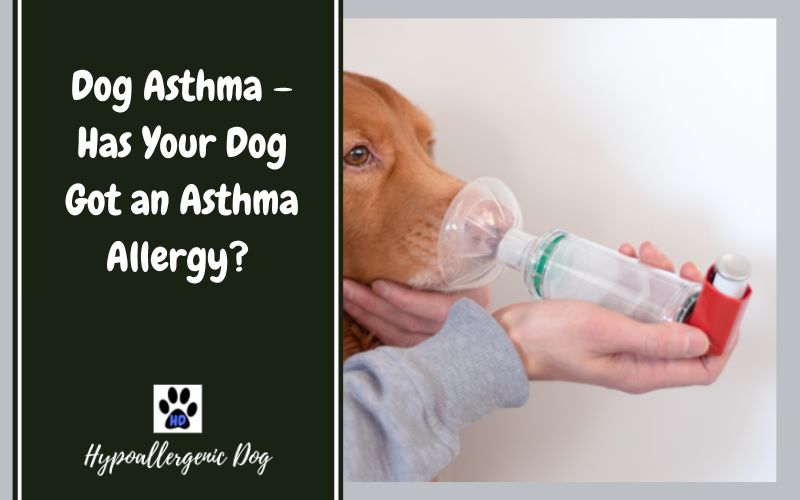Is My Dog Suffering From Dog Asthma? What To Look Out For
While this condition is more prevalent in felines, if you want to know, can dogs get asthma? The answer is, yes.
Allergies are common in dogs and canine asthma is one of them, triggered by many environmental factors. It poses the same if not similar risks and symptoms to that in humans.
If you’re ever unlucky enough to know what asthma feels like you’ll understand how uncomfortable and life-threatening it could be without the correct intervention. Hence, it’s important that as owners, we’re aware of what to look out for.
Fear not, asthma in dogs can be managed and can become a part of your daily routine. I’ve put together a list of the main symptoms and what you can do to help diagnose and discover the correct treatment for your perfect pooch.
Does My Dog Have Asthma? The Symptoms
Many vets refer to it as bronchitis, and it’s most common between dogs’ mid to older age. If left untreated, it could lead to permanent damage.
You may be wondering what a dog with asthma sounds like. To help you out, check out this asthma in dogs video.
If you suspect your dog has asthma, here are some of the tell-tale signs you should be looking out for.
Breathing Difficulties
Trouble breathing is one of the most common symptoms of a dog with asthma. This condition causes your dog’s respiratory system to spasm and contract. Hence, it’s no wonder your dog may be gasping or panting heavily.
If your pup’s breathing seems labored, it’s not the time to panic. A trip to the vets will help settle your fears.
Remember, there could be several reasons why they’re struggling — asthma is not the only cause for this reaction. Dog allergies and asthma often go hand in hand.
Hacking Cough
This is the biggest warning sign of puppy asthma! If your dog has developed a persistent cough, alarm bells should be ringing. Asthmatic coughs can appear over time or suddenly. It’s your dog’s way of clearing their airway to enable more oxygen to enter their lungs.
If you’ve ever had a coughing fit yourself, you can understand and sympathize with your pooch at how frightening this can be. Don’t ignore this symptom.
Wheezing
Another trait of asthma in dogs is the wheeze. This can be the first indicator that alerts you to the very fact your dog is struggling. A wheeze occurs when your dogs’ airways become compromised. The oxygen has a narrow path to reach the lungs, and it can present itself as a wheezing sound.
If you notice this, consult your vet immediately — it’s proof your dog is struggling to breathe.
Loss of Energy and Appetite
If your dog has displayed any of the symptoms above it may be paired with a loss of energy or appetite.
Have you ever gone for a run when you’re struggling to breathe? The simple answer is no!
If your dog is having difficulties, you’ll notice very quickly that they will become lethargic. This is because they’re using up all their energy to focus on breathing.
The same goes for their appetite, all their attention is on getting oxygen into their lungs. Hence, they may go off their food as a result.
I Think My Dog Has Asthma — Now What?
For the vet to diagnose this condition, your pooch will have to undergo a series of tests to rule out other illnesses, such as heart problems, bacterial infections, and heartworm. Your vet may insist on a blood panel being taken, and x-rays may be required to determine what is going on in your dogs’ lungs.
What Treatments Are Available?
Asthma in canines can be caused by age and environmental factors. Admittedly, you can’t prevent them from getting older, but you can control the indicators in their surroundings that could set off an attack.
Top asthma triggers include:
- Tobacco smoke.
- Cleaning products.
- Air fresheners.
- Perfumes and scented products.
- Pollen.
- Mold.
Many of these can be straightforward to manage.
For example:
- Smoking — go outside, or quit it, for your sake too.
- Cleaning products — choose unscented. Or if using perfumed products, ensure you’re doing it in a well-ventilated room and keep your best friend out of the way while you’re using it.
- Pollen — while you may not be able to control this seasonal trigger, you can minimize exposure. Try to avoid walking your pooch when levels are at their highest — early mornings or late afternoons.
- Change the diet — dog asthma is more common when immune systems are weak. Hence, switch up their menu, in a controlled way, to an immune boosting recipe.
Asthma for dogs can be a scary experience, yet as your dog’s guardian, you need to remain calm to help your furry friend the best way you can.
Conclusion
However, as we’ve seen, there are simple steps you can take to reduce potential triggers — dog asthma doesn’t have to dictate what your pooch can and can’t do. Life can continue with little disruption, and it’s important to allow your dog to be a dog!
Dog Asthma FAQs
“How Do You Know if Your Dog Has Asthma?”
The most common symptoms to look out for are wheezing, coughing, heavy panting, or a sudden loss of energy or appetite.
“What Are the Symptoms of Asthma in a Dog?”
There are two common signs of an asthmatic dog — coughing and wheezing. These symptoms may be worsened with over-excitement and exercise. It can regularly be accompanied by a hacking-type cough or retching. Seek advice from your vet if you are concerned.
“Can Dogs Use Human Albuterol?”
Although albuterol is commonly used to treat cats, dogs, and horses suffering from breathing issues. Incorrect dosage of the drug can be toxic, so it’s best to only use it under the guidance of your vet.
“How Do You Help A Dog With Asthma?”
Medications for canine asthma are readily available from your vet. Albuterol Sulphate can help to relax the airway of an asthmatic dog and improve their breathing.
“How Do You Give A Dog Albuterol?”
You may be wondering how you are going to get your dog to take their asthma medication. Here is a video to help you out.
“What Triggers Dog Asthma?”
Many things can trigger asthma in dogs but some of the most common are cigarette smoke, cleaning products, pollen, and mold.


